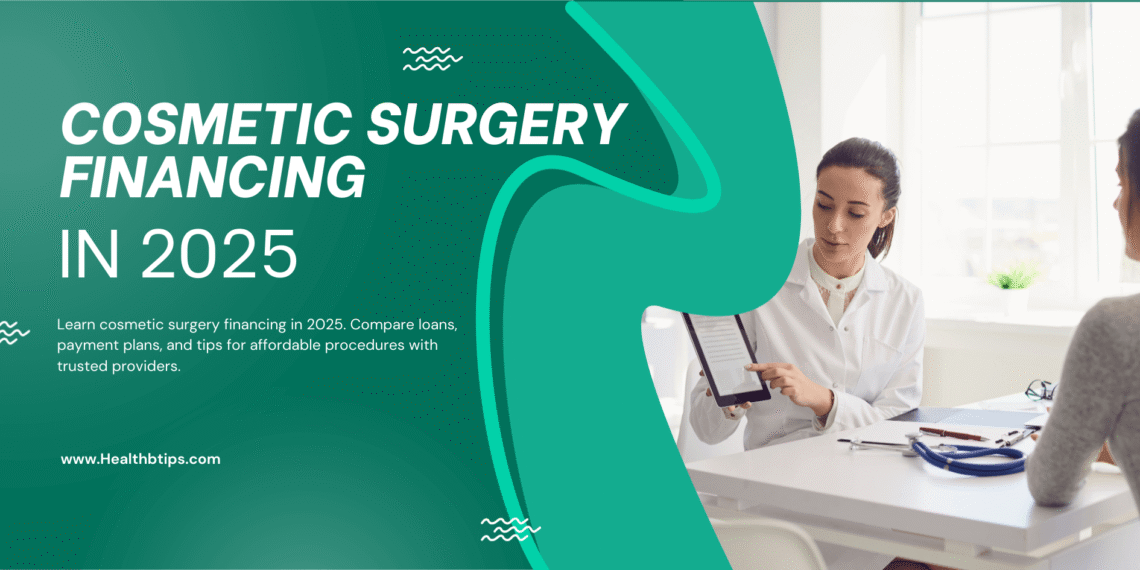In 2025, cosmetic surgery is more popular than ever—driven by advancements in techniques, faster recovery times, and the desire for lasting confidence boosts. Whether it’s a facelift, liposuction, or breast augmentation, thousands of Americans invest in procedures each year to enhance their appearance.
But there’s one hurdle for many patients: the cost. A single procedure can cost anywhere from a few thousand dollars to well over $20,000. That’s where cosmetic surgery financing steps in—making it possible to achieve your desired results without paying the full amount upfront.
This guide explores why procedures are so expensive, the top financing options in 2025, and how to choose an affordable, reputable provider.
Why Cosmetic Surgery Costs Are High
Several factors influence the total price of a cosmetic procedure:
- Surgeon’s Expertise: Board-certified surgeons with extensive experience typically charge more.
- Procedure Complexity: A simple Botox session may cost $400, while a full facelift ranges from $8,000–$15,000.
- Facility & Anesthesia Fees: Surgical centers and anesthesiologists add to the bill.
- Geographic Location: Prices are higher in major cities like Los Angeles and New York.
Average 2025 Costs (US):
- Facelift: $8,000–$15,000
- Liposuction: $3,500–$7,000
- Breast Augmentation: $6,000–$10,000
- Tummy Tuck: $8,000–$12,000
Top Cosmetic Surgery Financing Options in 2025
If paying upfront isn’t possible, financing can spread the cost over months or years. Here are the most common options:
1. Medical Loans
Unsecured personal loans from banks, credit unions, or online lenders.
Pros:
- Fixed monthly payments
- Can cover multiple procedures
- Competitive rates for good credit
Cons:
- Requires strong credit history
- Interest rates vary (6%–20%+)
2. Credit Cards
Some patients use 0% introductory APR credit cards for short-term financing.
Pros:
- Quick approval
- Rewards or cashback potential
- No interest during promo period
Cons:
- High interest after intro period (15%–25%)
- Can impact credit utilization
3. Clinic Payment Plans
Many cosmetic surgery clinics offer in-house financing.
Pros:
- Easy to arrange directly with your provider
- Sometimes interest-free
Cons:
- Limited to procedures at that clinic
- May require a large deposit
4. Specialized Medical Credit Providers
Popular options in 2025 include:
| Lender | APR Range | Key Features |
|---|---|---|
| CareCredit | 0%–26.99% | Widely accepted, 6–24 month plans |
| Alphaeon Credit | 14.99%+ | Designed for elective healthcare |
| United Medical Credit | Varies | Works with multiple lenders |
How to Qualify for Cosmetic Surgery Financing
- Check Your Credit Score: Most lenders require 650+ for favorable terms.
- Prepare Documentation: Proof of income, ID, and procedure cost estimate.
- Consider a Co-Signer: Helps if your credit is below average.
- Get Multiple Quotes: Compare interest rates, fees, and repayment terms.
For low credit scores:
Explore secured loans, higher-interest short-term plans, or savings programs offered by clinics.
Risks of Financing Cosmetic Surgery
While financing can make procedures more accessible, it’s important to understand potential downsides:
- High Interest Rates: Particularly with bad credit.
- Hidden Fees: Origination charges, late fees, or prepayment penalties.
- Debt Stress: Large monthly payments can strain finances.
Tips to Reduce Risks:
- Choose shorter repayment terms to save on interest.
- Avoid borrowing more than you can comfortably repay.
- Read contracts carefully before signing.
Choosing a Reputable Provider
Your surgeon’s qualifications are just as important as your financing plan.
Look for:
- Board Certification: From the American Board of Plastic Surgery (ABPS).
- Before-and-After Photos: Verify real patient results.
- Transparent Pricing: Clear breakdown of costs.
Questions to Ask During Consultation:
- Do you offer in-house financing or partner with lenders?
- What’s included in the quoted price?
- What are the risks and recovery expectations?
(Tip: Including links to trusted cosmetic clinics here can attract high-CPC ad relevance.)
Cosmetic surgery financing in 2025 offers more flexibility than ever, with options ranging from specialized medical credit cards to personal loans and clinic payment plans. By understanding your financing choices, comparing lenders, and selecting a qualified surgeon, you can move forward with confidence—without compromising your financial stability.
Call to Action:
Explore financing options from trusted providers like CareCredit or discuss payment plans with your surgeon today to make your dream procedure a reality.
❓ Frequently Asked Questions (FAQs)
Q1. Can I finance any cosmetic surgery procedure?
A: Yes, most elective procedures can be financed if you qualify.
Q2. What credit score do I need for CareCredit?
A: Typically 650+, though approval is possible with lower scores at higher rates.
Q3. Is it better to use a personal loan or clinic financing?
A: Personal loans often have fixed rates and flexibility, while clinic plans may offer interest-free terms for shorter repayment periods.
Q4. Are there 0% interest options?
A: Some credit cards and financing promotions offer 0% interest for 6–24 months.
Q5. Will financing cosmetic surgery affect my credit?
A: Yes, applying for loans or credit cards results in a hard inquiry, and missed payments can lower your score.





